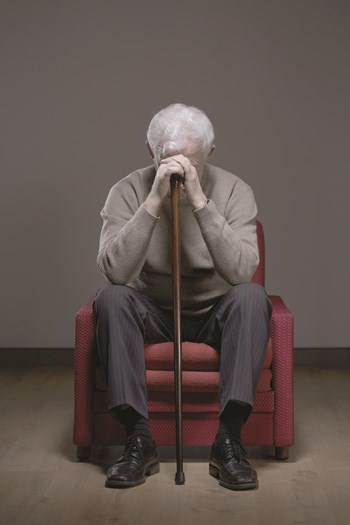
Co-ops and condos are called communities for a reason—families and individuals live side by side with one another, sometimes for years or even decades. Although residents may not exchange much more than a “hello” or “nice day” with their neighbors, there is still a human connection. So when a neighbor displays unusual or changed behavior, those who live next door or across the hall from them are often among the first to notice that something is amiss.
It can be an awkward situation, given the premium that so many of us place on privacy. It is difficult to know when to lend a hand, try to help or report the issues to others, whether it be family members (if any are known) or government agencies. And when it comes to older adults who may be coping with the difficulties associated with aging, the equation is further muddled by a desire to preserve respect and show deference to our elders.
Andrew Fortin, senior vice president of communications for Associa, a large association management company with offices nationwide, including about a dozen in Florida, recalls a few such incidents. He relates one story from a colleague in the industry about a situation that started off looking like a not-unusual case of neighbor-vs-neighbor conflict, but wound up being something much more serious.
“This condo had to deal with a resident who was dissatisfied with the outcome of a dispute with a neighbor,” he says. “So she began sending emails to the media, competing management firms, and others claiming the outcome was a result of bias by the board due to her sexual orientation. The emails were very strong, and included terms like ‘liars,’ ‘bigots,’ ‘illegal discrimination,’ among the more gentle words used.”
While the manager intervened and tried to hire a mediator to resolve the issues, the situation continued to deteriorate, with the aggrieved resident becoming increasingly irrational and combative. Eventually it became clear that there was much more afoot than just a spat between neighbors; indeed, at one point the resident ended up being involuntarily committed to a mental health care facility.
Another memorable incident for an attorney involved a dispute between an owner and a board regarding the use of the association’s clubhouse, which is a limited common element. According to Russell Robbins, a managing partner at the law firm of Mirza Basulto & Robbins, LLP with offices in Miami Lakes and Coral Springs, “The unit owner believed that paying her monthly condo fees entitled her to dictate the operating hours of the clubhouse—and the exercise room in particular. The resident refused to leave the clubhouse at closing time, and eventually had to be carried out by law enforcement officers.” After the incident, the resident sent a letter to the board advising them that she would be returning to the exercise room, and if anyone approached her while she was working out, she would spray them with wasp spray.
While it's easy to chuckle a little at such instances, the truth of the matter is that for fellow residents, board members and managers, these situations can be very difficult to handle. Neighbors and building administrators are under no legal obligation to step in and rectify a situation; these are individual unit owners or shareholders. They are not living in assisted care residences. As much as the building itself may be a community, that community is still comprised of individuals, all of whom have a right to privacy.
“A property manager is hired to manage and maintain real estate assets,” says Donna Scholes, spokesperson for the Greater New York Chapter of the Institute of Real Estate Management. “While individually we may empathize with an individual’s personal difficulties, our fiduciary responsibility mandates that we treat all residents equitably, including expecting every resident to comply with the development’s rules and regulations.”
This is also true when and if an individual is having financial difficulties or trouble meeting their obligations as a community member because of personal problems they may be facing. “When it comes to a resident’s personal issues, most property managers will attempt to be supportive within the constraints of the management contract, and the development’s rules and regulations,” says Scholes, “but at the end of the day, the property manager is not given the flexibility to waive any violations or non-compliance.”
Attorney David Byrne, a partner at the Princeton, New Jersey office of the law firm Ansell Grimm & Aaron, P.C., says, “The building or management has no obligation to do anything. These are private people.”
This is not to say that neighbors, board members or managers may not want to help, simply out of the kindness of their hearts, just that there are no liability or legal issues that would compel them to do so. If they do want to help, “They can call government services, or try to locate family members,” Byrne says.
Ultimately, when personal problems, including mental health issues, become disruptive to neighbors or pose a risk for the individual undergoing them, board members, managers and neighbors most often have to rely on others to ease or resolve the situation.
“It is to be hoped that caring family members or outside agencies such as Adult Protective Services will be available to help the resident overcome his or her personal difficulties,” says Scholes.
Birenbaum specializes in helping older adults, especially those who may be without close family members or friends nearby. The signs of trouble can vary, but things to watch for include difficulties with mobility, falling, confusion and other changes in behavior, she says. Problems also can arise when a husband or wife is healthy but their spouse is ill. “What happens when a husband or wife who is healthy can no longer care for the spouse who is infirm?” Birenbaum says. The burden can be crippling, and cause a downward spiral.
Among aging adults, there is also “a...propensity for hoarding and alcoholism,” Birenbaum says. As a court evaluator, she has seen plenty of these cases, including one in which an older adult had saved all of her Meals on Wheels containers and other empty food boxes, and was filling the storage space under her stove’s gas burner with paper towels—a clear fire hazard not just for her, but for her neighbors. “She was a 90 year old woman with no close relatives,” Birenbaum says.
Alcoholism can be an issue for older adults because “They're alone, and alcohol is easy to get,” says Birenbaum. She cites one building that put a restriction on certain liquor store deliveries because of this problem. Sadly, having troubled older adults in buildings is not an isolated or rare issue, especially in a large city—and especially in today’s society, when families are often disjointed due to geography and cultural trends. “Before World War II, people went back to their communities and they took in elderly parents and relatives,” says Birenbaum. “Today, people don’t have their children there to help them. The kids will call their parents regularly, but they have their lives. They can’t come in regularly from California.”
Phone calls, though, are not always a good indicator of an older person’s well being. “People can hold it together for a ten minute phone call,” Birenbaum continues, “but how are you going to know your mother got lost that morning on the way to they grocery store she’s gone to for 35 years?”
Sometimes the adult children will feel their parents are being looked after in a building with a doorman or other staff, but according to Birenbaum, a doorman can get in trouble for leaving his or her post to help one particular resident. As for the board, “They have a responsibility for caring for fiduciary needs, not neighbors.”
She adds that people may want to help but it can be a tricky situation. “Yes it’s your neighbor but it’s a fine line—you don’t know if you should get involved, and it can become a huge thing that you can get pulled into.”
For people who live far away from their parents, or whose jobs prevent them from being able to spend additional time with them, Aging Life Care Managers can make an enormous difference. Aging Life Care Managers can make use of local and state agencies as well as nonprofit services to build a system of support around vulnerable older adults. They also can provide support for caregivers who may need a break, or who are putting their own health at risk from overwork. In addition, Birenbaum recommends looking into outreach programs held by churches, synagogues or neighborhood community centers.
Birenbaum also encourages basic acts of kindness to help neighbors who may be coping with difficulties. Socialization is important, so doing something small like having a cup of tea with someone can make a big difference. “There’s real loneliness,” she says. “No one tells you what it’s like to get old.”
While the pros stress that it's not legally incumbent on boards or managers to intervene in resident's personal issues, they agree that it is important to make sure that your community's administrative team has protocols in place for when a situation does arise. For example, it's very helpful for boards to hold closed meetings to discuss candidly how to deal with a resident in crisis, and to have a basic understanding of conflict resolution methods.
There are resources available to support boards and managers in this, including conflict resolution courses hosted by local law firms, state agencies or sometimes by management companies themselves. The South Florida Cooperator offers seminars on resolving conflict at its annual Co-op, Condo & HOA Expo—seminars are free, and include a Q&A section for attendees to ask a panel of legal experts just about anything related to the law. In addition, Florida condo association residents have access to a state ombudsman program to assist with disputes. The state of Florida also offers a course of board governance, and residents may also take in-person or online residence-only classes via trade groups such as the Community Associations Institute (CAI), of which there are 8 chapters in Florida.
It's also extremely helpful for a board or management team to have emergency contact information for their residents, especially any older folks who may live alone. That way, should board members or managers want to help or feel that there is a significant need, they can get in touch with people who have the ability to really make a difference for that person.
Whether in a high-rise or in a spread-out suburb, living in a condo or HOA may be the closest thing individuals have to a community. While there are no legal or contractual obligations for board members, managers or residents to look after their neighbors, often the urge to help is simply a matter of kindness. We see someone in need and we want to help. By knowing who to call and when to call when things get bad, people can make a difference.
Elizabeth Lent is a freelance writer and a frequent contributor to The South Florida Cooperator.
It can be an awkward situation, given the premium that so many of us place on privacy. It is difficult to know when to lend a hand, try to help or report the issues to others, whether it be family members (if any are known) or government agencies. And when it comes to older adults who may be coping with the difficulties associated with aging, the equation is further muddled by a desire to preserve respect and show deference to our elders.
What's Expected?
The issues can start innocuously enough. Perhaps an older resident goes to the wrong door, or arrives at their mailbox at an odd time, wearing inadequate or inappropriate clothing. Maybe newspapers begin piling up outside a door, or a neighbor catches a glimpse into an apartment and notices that it's filled with trash. It could start with a confrontation in the hallway, or with shouting behind closed doors. Problems with individual residents can manifest themselves in countless ways, all spurring questions of what can or should be done.Andrew Fortin, senior vice president of communications for Associa, a large association management company with offices nationwide, including about a dozen in Florida, recalls a few such incidents. He relates one story from a colleague in the industry about a situation that started off looking like a not-unusual case of neighbor-vs-neighbor conflict, but wound up being something much more serious.
“This condo had to deal with a resident who was dissatisfied with the outcome of a dispute with a neighbor,” he says. “So she began sending emails to the media, competing management firms, and others claiming the outcome was a result of bias by the board due to her sexual orientation. The emails were very strong, and included terms like ‘liars,’ ‘bigots,’ ‘illegal discrimination,’ among the more gentle words used.”
While the manager intervened and tried to hire a mediator to resolve the issues, the situation continued to deteriorate, with the aggrieved resident becoming increasingly irrational and combative. Eventually it became clear that there was much more afoot than just a spat between neighbors; indeed, at one point the resident ended up being involuntarily committed to a mental health care facility.
Another memorable incident for an attorney involved a dispute between an owner and a board regarding the use of the association’s clubhouse, which is a limited common element. According to Russell Robbins, a managing partner at the law firm of Mirza Basulto & Robbins, LLP with offices in Miami Lakes and Coral Springs, “The unit owner believed that paying her monthly condo fees entitled her to dictate the operating hours of the clubhouse—and the exercise room in particular. The resident refused to leave the clubhouse at closing time, and eventually had to be carried out by law enforcement officers.” After the incident, the resident sent a letter to the board advising them that she would be returning to the exercise room, and if anyone approached her while she was working out, she would spray them with wasp spray.
While it's easy to chuckle a little at such instances, the truth of the matter is that for fellow residents, board members and managers, these situations can be very difficult to handle. Neighbors and building administrators are under no legal obligation to step in and rectify a situation; these are individual unit owners or shareholders. They are not living in assisted care residences. As much as the building itself may be a community, that community is still comprised of individuals, all of whom have a right to privacy.
“A property manager is hired to manage and maintain real estate assets,” says Donna Scholes, spokesperson for the Greater New York Chapter of the Institute of Real Estate Management. “While individually we may empathize with an individual’s personal difficulties, our fiduciary responsibility mandates that we treat all residents equitably, including expecting every resident to comply with the development’s rules and regulations.”
This is also true when and if an individual is having financial difficulties or trouble meeting their obligations as a community member because of personal problems they may be facing. “When it comes to a resident’s personal issues, most property managers will attempt to be supportive within the constraints of the management contract, and the development’s rules and regulations,” says Scholes, “but at the end of the day, the property manager is not given the flexibility to waive any violations or non-compliance.”
Attorney David Byrne, a partner at the Princeton, New Jersey office of the law firm Ansell Grimm & Aaron, P.C., says, “The building or management has no obligation to do anything. These are private people.”
This is not to say that neighbors, board members or managers may not want to help, simply out of the kindness of their hearts, just that there are no liability or legal issues that would compel them to do so. If they do want to help, “They can call government services, or try to locate family members,” Byrne says.
Don't Just Stand There…
The scenario shifts slightly in certain cases—like hoarding issues, for example, or situations in which a resident is making threats, such as the aforementioned Wasp Spray Lady. In those cases, “The ability of board members and managers to do something is a little bit different,” says Byrne. “They have to establish that someone is maintaining an unsafe environment. In that case, they can evict or go through the actions laid out in their building’s governing documents.”Ultimately, when personal problems, including mental health issues, become disruptive to neighbors or pose a risk for the individual undergoing them, board members, managers and neighbors most often have to rely on others to ease or resolve the situation.
“It is to be hoped that caring family members or outside agencies such as Adult Protective Services will be available to help the resident overcome his or her personal difficulties,” says Scholes.
Elderly Residents
As the nation as a whole becomes older and the Baby Boomer generation begins to hit their 70s, the challenges associated with aging are becoming more widespread. In the 1950s and 1960s, developers began erecting apartment buildings. People moved in and began growing their families, says Susan Birenbaum, an Aging Life Care Manager and owner of the firm Humanittude LLC. In the 1980s, many of those buildings converted to condos (and co-ops, in certain cities). Many of those original tenants “were still there and still functioning well,” says Birenbaum. “Now today, these people are very elderly.” With this natural change in demographics, more of the difficulties surrounding advanced age are becoming apparent in the halls and units of multifamily buildings.Birenbaum specializes in helping older adults, especially those who may be without close family members or friends nearby. The signs of trouble can vary, but things to watch for include difficulties with mobility, falling, confusion and other changes in behavior, she says. Problems also can arise when a husband or wife is healthy but their spouse is ill. “What happens when a husband or wife who is healthy can no longer care for the spouse who is infirm?” Birenbaum says. The burden can be crippling, and cause a downward spiral.
Among aging adults, there is also “a...propensity for hoarding and alcoholism,” Birenbaum says. As a court evaluator, she has seen plenty of these cases, including one in which an older adult had saved all of her Meals on Wheels containers and other empty food boxes, and was filling the storage space under her stove’s gas burner with paper towels—a clear fire hazard not just for her, but for her neighbors. “She was a 90 year old woman with no close relatives,” Birenbaum says.
Alcoholism can be an issue for older adults because “They're alone, and alcohol is easy to get,” says Birenbaum. She cites one building that put a restriction on certain liquor store deliveries because of this problem. Sadly, having troubled older adults in buildings is not an isolated or rare issue, especially in a large city—and especially in today’s society, when families are often disjointed due to geography and cultural trends. “Before World War II, people went back to their communities and they took in elderly parents and relatives,” says Birenbaum. “Today, people don’t have their children there to help them. The kids will call their parents regularly, but they have their lives. They can’t come in regularly from California.”
Phone calls, though, are not always a good indicator of an older person’s well being. “People can hold it together for a ten minute phone call,” Birenbaum continues, “but how are you going to know your mother got lost that morning on the way to they grocery store she’s gone to for 35 years?”
Sometimes the adult children will feel their parents are being looked after in a building with a doorman or other staff, but according to Birenbaum, a doorman can get in trouble for leaving his or her post to help one particular resident. As for the board, “They have a responsibility for caring for fiduciary needs, not neighbors.”
She adds that people may want to help but it can be a tricky situation. “Yes it’s your neighbor but it’s a fine line—you don’t know if you should get involved, and it can become a huge thing that you can get pulled into.”
Ways to Help
In most situations, all but the most troubled residents can be handled internally by a responsive board and a competent manager. According to Fortin, property managers are typically the first responders to a situation involving a struggling or unwell resident. “This highlights the truly unique role that the community association manager plays, and highlights the challenges of their job,” he says.For people who live far away from their parents, or whose jobs prevent them from being able to spend additional time with them, Aging Life Care Managers can make an enormous difference. Aging Life Care Managers can make use of local and state agencies as well as nonprofit services to build a system of support around vulnerable older adults. They also can provide support for caregivers who may need a break, or who are putting their own health at risk from overwork. In addition, Birenbaum recommends looking into outreach programs held by churches, synagogues or neighborhood community centers.
Birenbaum also encourages basic acts of kindness to help neighbors who may be coping with difficulties. Socialization is important, so doing something small like having a cup of tea with someone can make a big difference. “There’s real loneliness,” she says. “No one tells you what it’s like to get old.”
While the pros stress that it's not legally incumbent on boards or managers to intervene in resident's personal issues, they agree that it is important to make sure that your community's administrative team has protocols in place for when a situation does arise. For example, it's very helpful for boards to hold closed meetings to discuss candidly how to deal with a resident in crisis, and to have a basic understanding of conflict resolution methods.
There are resources available to support boards and managers in this, including conflict resolution courses hosted by local law firms, state agencies or sometimes by management companies themselves. The South Florida Cooperator offers seminars on resolving conflict at its annual Co-op, Condo & HOA Expo—seminars are free, and include a Q&A section for attendees to ask a panel of legal experts just about anything related to the law. In addition, Florida condo association residents have access to a state ombudsman program to assist with disputes. The state of Florida also offers a course of board governance, and residents may also take in-person or online residence-only classes via trade groups such as the Community Associations Institute (CAI), of which there are 8 chapters in Florida.
It's also extremely helpful for a board or management team to have emergency contact information for their residents, especially any older folks who may live alone. That way, should board members or managers want to help or feel that there is a significant need, they can get in touch with people who have the ability to really make a difference for that person.
Whether in a high-rise or in a spread-out suburb, living in a condo or HOA may be the closest thing individuals have to a community. While there are no legal or contractual obligations for board members, managers or residents to look after their neighbors, often the urge to help is simply a matter of kindness. We see someone in need and we want to help. By knowing who to call and when to call when things get bad, people can make a difference.
Elizabeth Lent is a freelance writer and a frequent contributor to The South Florida Cooperator.









Leave a Comment